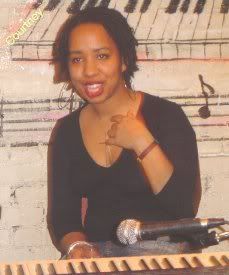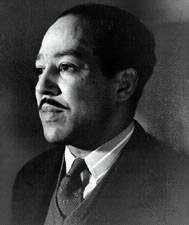 C
Courtney Bryan, born in New Orleans, Louisiana on August 16, 1982, is a prolific and eclectic composer, pianist, arranger, and poet. Her overall ambition in life is the “creation of uninhibited beauty.” Her compositions are wide-ranging, including Solo Works, Jazz Quartet, Jazz Orchestra, Symphonic Orchestra, and even collaborations of dancers, visual artists, writers, and actors.
Bryan currently performs in and around New York with the Courtney Bryan Trio at venues like St. Nick’s Pub, A Gathering of Tribes Gallery, and Cecil’s Jazz Club. The Courtney Bryan Trio has also headlined at the Snug Harbor Jazz Bistro and Sweet Lorraine’s Jazz Club of New Orleans, Louisiana. Bryan co-leads Duet, with vocalist TreZure Mone performing a mix of Jazz and Rhythm and Blues. She co-developed co-leads the Courtney Bryan/Ez Weiss Jazz Orchestra in New York, a Big Band organization that is composed of volunteer musicians who are particularly interested in the revival of Big Band. In addition, she freelances with various jazz and R & B artists.
Recently, the Courtney Bryan Trio featuring saxophonist Donald Harrison opened for the Curtis Fuller/Louis Hayes Quintet and the Chico Hamilton Sextet at the Guild Hall in East Hampton, New York. Also, Bryan performed as part of Stanley Cowell’s Piano Choir in the Spring of 2006. Bryan’s compositions have been commissioned by Cleveland State University’s Jazz Heritage Orchestra, Dennis Reynold’s Brass Choir, Conrad Herwig’s Scarlet Knight Trombone Ensemble, and by saxophonist Devin Phillips for his 2006 release Wade in the Water, which was titled after her arrangement. She was featured as composer with Kathy Randel’s Artspotproductions in The New Orleans Suite performed at the prestigious Contemporary Arts Center of New Orleans, Lousiana in 2005. Bryan was also recently a finalist in the Beyonce Knowles All-Girl Band competition for her B-Day tour. She has a CD entitled
Quest for Freedom featuring the legendary Marcus Belgrave.
AVAILABLE NOW! Currently, Courtney Bryan is a candidate for a masters’ degree in Jazz Piano with Stanley Cowell at the Mason Gross School of Rutgers, the State University of New Jersey. She also is the choir director at Trinity Methodist Church and Monroe Community Church of New Jersey and teaches piano through the Rutgers Community Music Program. Bryan graduated with honors from the Oberlin Conservatory of Oberlin, Ohio with a bachelor’s degree in Music Composition studying with composers Jeffrey Mumford and Wendell Logan.
While in high school, Courtney Bryan attended the notable New Orleans Center for the Creative Arts under the mentorship of Clyde Kerr, Jr. During this time, Bryan was featured along with Jason Marsalis and Irvin Mayfield in Geoffrey Poister’s documentary Jazz Dreams. Courtney Bryan has performed in the New Orleans Jazz and Heritage Festival 2000-2002, in the Detroit Ford International Jazz Festival 2003 and 2004, in the Lansing Jazz Festival 2004, and in the Detroit Taste Fest 2005. She has also performed at the Cleveland Bop Stop and Nighttown of Cleveland, Ohio; the Serengeti Gallery of Detroit, Michigan, among other venues. In 2002, Bryan was selected as a NOCCA (New Orleans Center for the Creative Arts) All-Star along with such musicians as Nicholas Payton, Donald Harrison, Adonis Rose, and Clyde Kerr, Jr.
One of Bryan’s recent compositions
REALIZE, REDEEM, REFORM, REPLENISH, RENEW is a collaborative work with Five Artists (Alden Young, Kiel Scott, Alma Bryan, Amy Bryan, and Zarouhie Abdalian), Four Dancers (Nic Trovato, Sherece Donalds, Pia Murray, and Karla Victum), and Five Music ensembles (Solo Violoncello, Two Trombones, World Music Ensemble The Melodic Prophets, Jazz Orchestra, and a full Symphonic Orchestra.) In addition to being chief coordinator on this project, Courtney contributed original visual artwork as well.
Courtney Bryan’s professors include Stanley Cowell, Ralph Bowen, Conrad Herwig, Jeffrey Mumford, Wendell Logan, Marcus Belgrave, Francis Walker, Dan Wall, Donald Byrd, Gary Bartz, Billy Hart, Clyde Kerr, Jr., Ellis Marsalis, Edward “Kidd” Jordan, Kent Jordan, Dean Curtis, Daniel Weilbaecher, Arthur Knight, Roger Dickerson, and the late Moses Hogan. Some groups and musicians performed with include the Gerald Wilson Jazz Orchestra, Marcus Belgrave Quartet, Troi Bechet Quartet, Clyde Kerr, Jr. Quintet, Donald Harrison Quartet, Christian Scott Quartet, Donald Byrd, Nicholas Payton, Michael Mossman, Maurice Brown, Sean Jones, Derrick Gardner, Troy “Trombone Shorty” Andrews, Sammie “Big Sam” Williams, Roland Guerin, Marion Hayden, Brian Quezerque, Jerome Jennings, Adonis Rose, James Alsanders, Jason Marsalis, Karriem Riggins, Ricky Sebastian, and Johnathan Blake.






